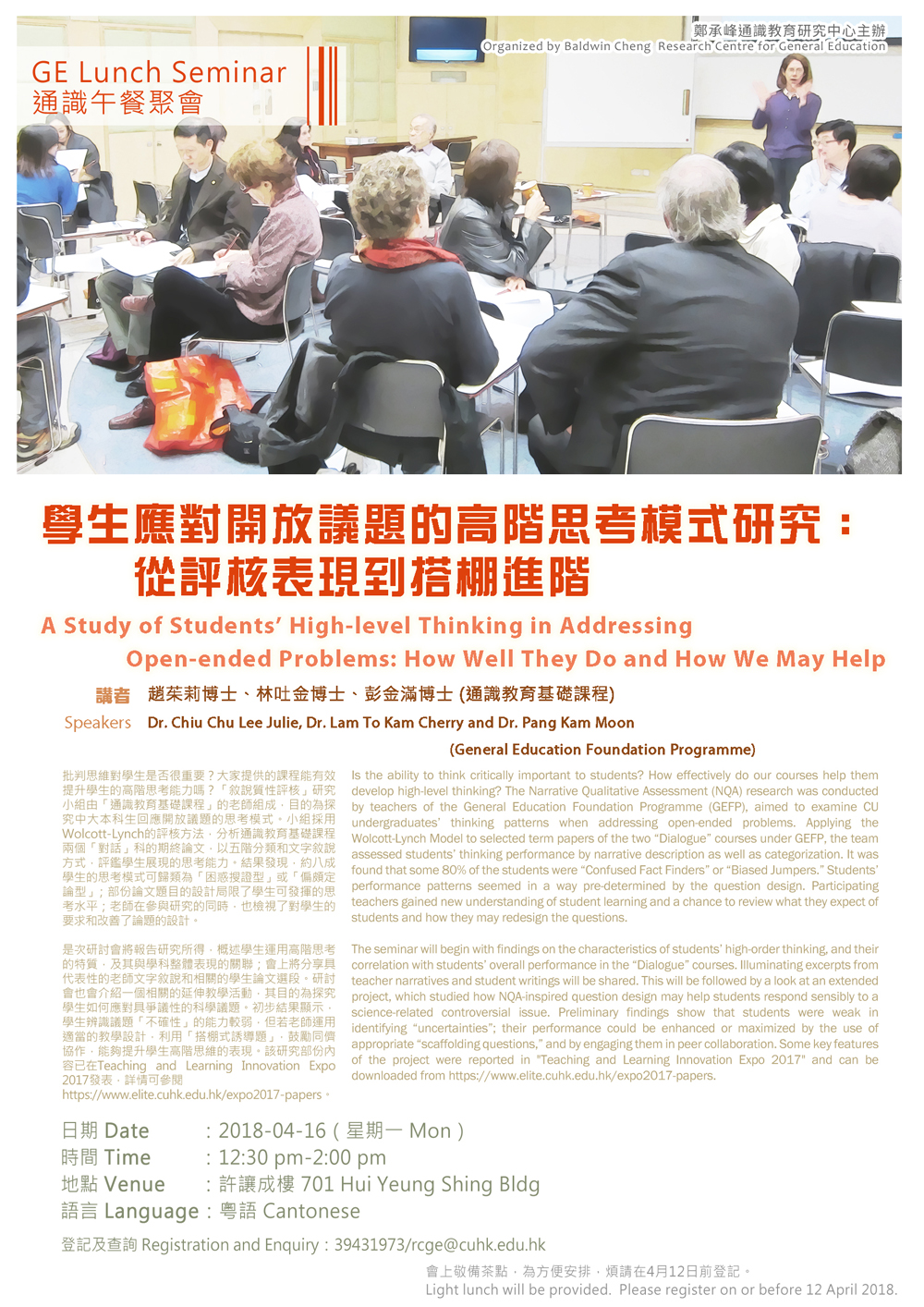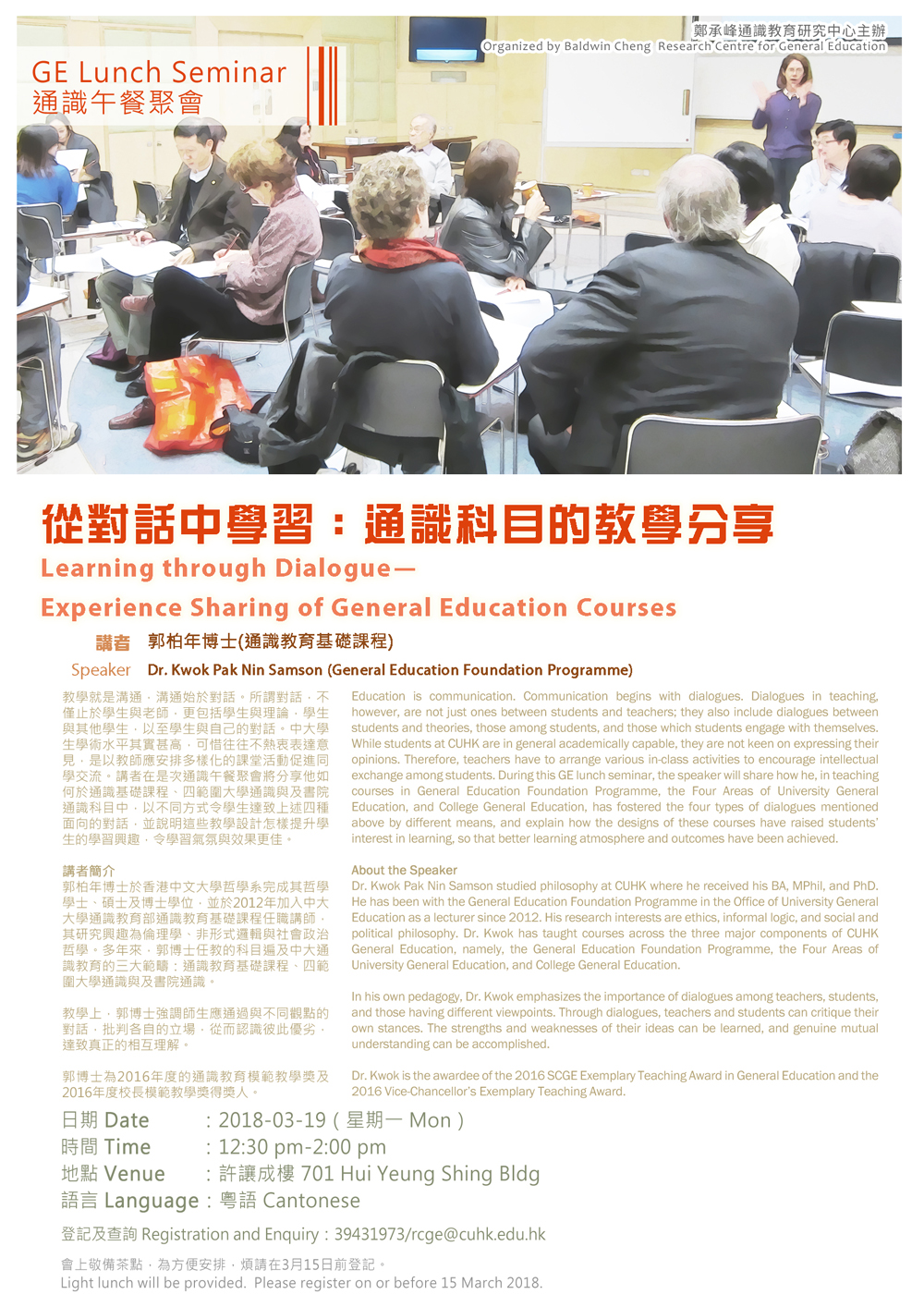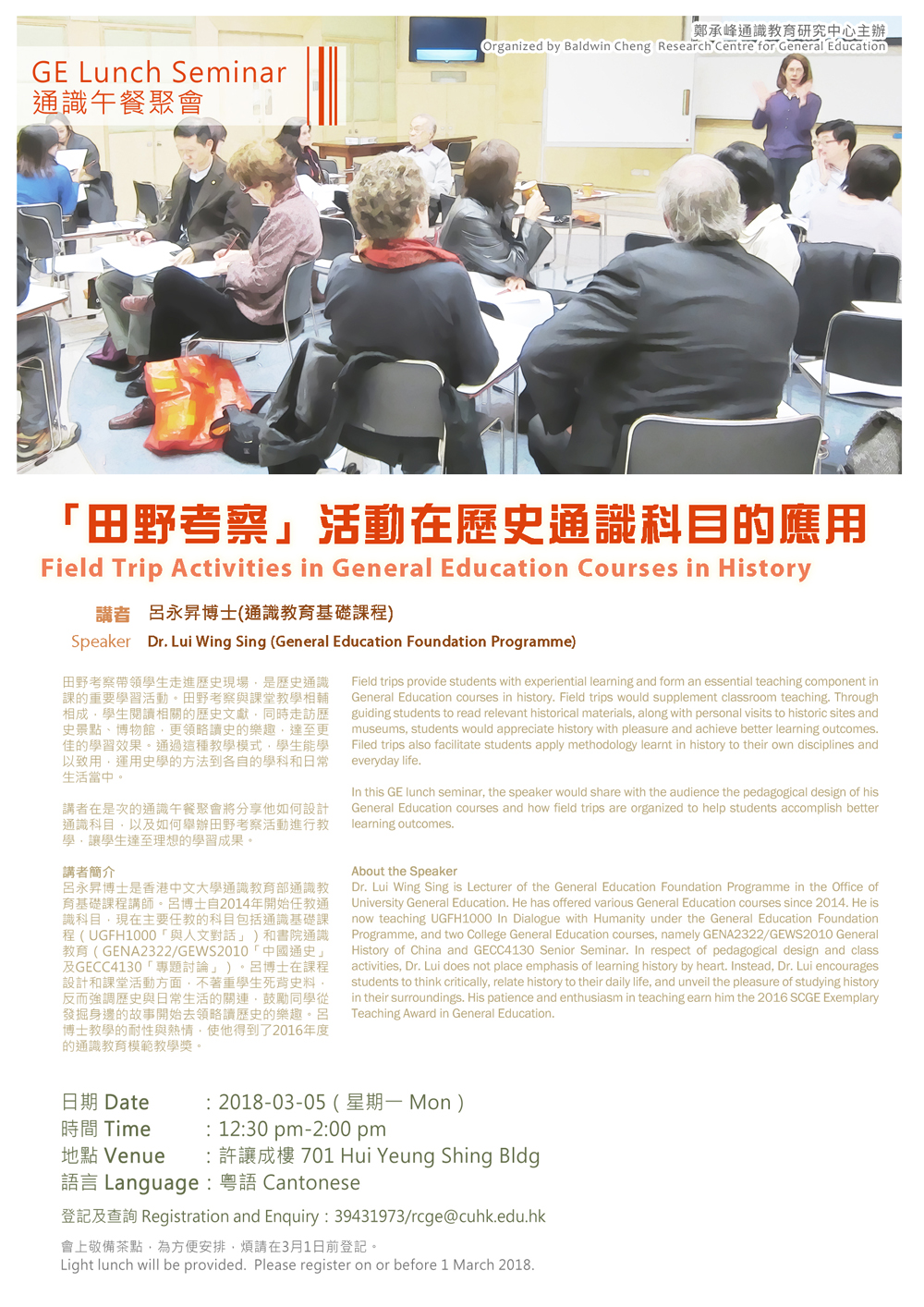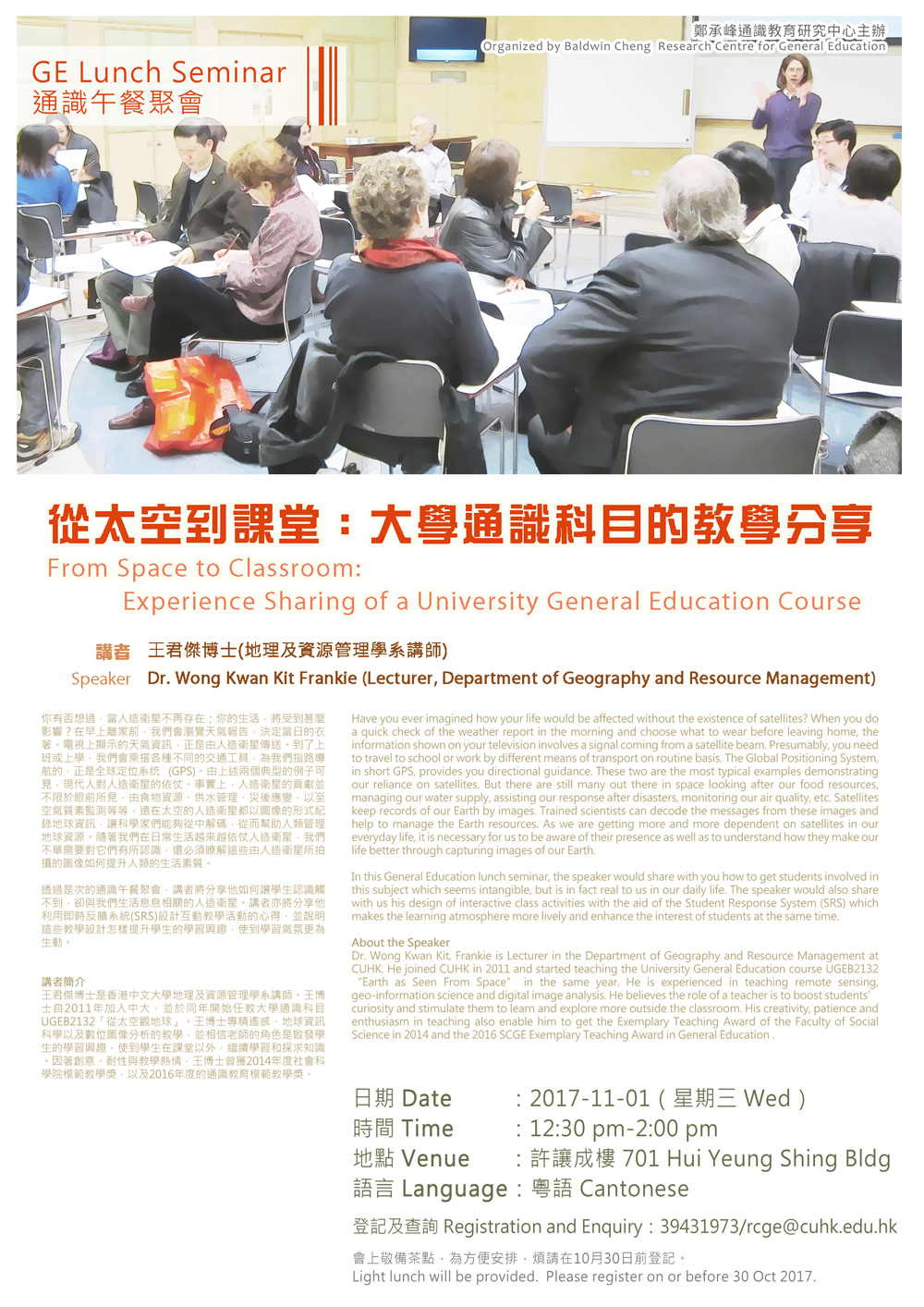A Study of Students’ High-level Thinking in Addressing Open-ended Problems: How Well They Do and How We May Help
A Study of Students’ High-level Thinking in Addressing Open-ended Problems: How Well They Do and How We May Help
Speakers:
Dr CHIU Chu Lee Julie (General Education Foundation Programme)
Dr LAM To Kam (General Education Foundation Programme)
Dr PANG Kam Moon (General Education Foundation Programme)
Date: 16 April 2018 (Monday)
Language: Cantonese
Is the ability to think critically important to students? How effectively do our courses help them develop high-level thinking? The Narrative Qualitative Assessment (NQA) research was conducted by teachers of the General Education Foundation Programme (GEFP), aimed to examine CU undergraduates’ thinking patterns when addressing open-ended problems. Applying the Wolcott-Lynch Model to selected term papers of the two “Dialogue” courses under GEFP, the team assessed students’ thinking performance by narrative description as well as categorization. It was found that some 80% of the students were “Confused Fact Finders” or “Biased Jumpers.” Students’ performance patterns seemed in a way pre-determined by the question design. Participating teachers gained new understanding of student learning and a chance to review what they expect of students and how they may redesign the questions.
The seminar will begin with findings on the characteristics of students’ high-order thinking, and their correlation with students’ overall performance in the “Dialogue” courses. Illuminating excerpts from teacher narratives and student writings will be shared. This will be followed by a look at an extended project, which studied how NQA-inspired question design may help students respond sensibly to a science-related controversial issue. Preliminary findings show that students were weak in identifying “uncertainties”; their performance could be enhanced or maximized by the use of appropriate “scaffolding questions,” and by engaging them in peer collaboration. Some key features of the project were reported in "Teaching and Learning Innovation Expo 2017" and can be downloaded from https://www.elite.cuhk.edu.hk/expo2017-papers.
Speakers' Bio
Dr CHIU Chu Lee Julie, Deputy Director of GEFP, and Dr LAM To Kam and Dr PANG Kam Moon, teachers of GEFP in the Office of University General Education, are core members of the Narrative Qualitative Assessment research team of GEFP. Since 2014, the team has been dedicated to qualitatively accessing the high-level thinking of CUHK undergraduates adopting a narrative approach and to analyzing their learning patterns so as to inform design of effective teaching and learning activities and hence to enhance student attainment of GEFP’s intended learning outcomes.
Learning through Dialogue--Experience Sharing of General Education Courses
Learning through Dialogue--Experience Sharing of General Education Courses
Speaker: Dr. Kwok Pak Nin Samson (General Education Foundation Programme)
Date: 19 March 2018 (Monday)
Language: Cantonese
Education is communication. Communication begins with dialogues. Dialogues in teaching, however, are not just ones between students and teachers; they also include dialogues between students and theories, those among students, and those which students engage with themselves. While students at CUHK are in general academically capable, they are not keen on expressing their opinions. Therefore, teachers have to arrange various in-class activities to encourage intellectual exchange among students. During this GE lunch seminar, the speaker will share how he, in teaching courses in General Education Foundation Programme, the Four Areas of University General Education, and College General Education, has fostered the four types of dialogues mentioned above by different means, and explain how the designs of these courses have raised students’ interest in learning, so that better learning atmosphere and outcomes have been achieved.
Speaker’s Bio
Dr. Kwok Pak Nin Samson studied philosophy at CUHK where he received his BA, MPhil, and PhD. He has been with the General Education Foundation Programme in the Office of University General Education as a lecturer since 2012. His research interests are ethics, informal logic, and social and political philosophy. Dr. Kwok has taught courses across the three major components of CUHK General Education, namely, the General Education Foundation Programme, the Four Areas of University General Education, and College General Education.
In his own pedagogy, Dr. Kwok emphasizes the importance of dialogues among teachers, students, and those having different viewpoints. Through dialogues, teachers and students can critique their own stances. The strengths and weaknesses of their ideas can be learned, and genuine mutual understanding can be accomplished.
Dr. Kwok is the awardee of the 2016 SCGE Exemplary Teaching Award in General Education and the 2016 Vice-Chancellor’s Exemplary Teaching Award.
Field Trip Activities in General Education Courses in History
Field Trip Activities in General Education Courses in History
Speaker: Dr. Lui Wing Sing (General Education Foundation Programme)
Date: 5 March 2018 (Monday)
Language: Cantonese
Field trips provide students with experiential learning and form an essential teaching component in General Education courses in history. Field trips would supplement classroom teaching. Through guiding students to read relevant historical materials, along with personal visits to historic sites and museums, students would appreciate history with pleasure and achieve better learning outcomes. Filed trips also facilitate students apply methodology learnt in history to their own disciplines and everyday life.
In this GE lunch seminar, the speaker would share with the audience the pedagogical design of his General Education courses and how field trips are organized to help students accomplish better learning outcomes.
Speaker’s Bio
Dr. Lui Wing Sing is Lecturer of the General Education Foundation Programme in the Office of University General Education. He has offered various General Education courses since 2014. He is now teaching UGFH1000 In Dialogue with Humanity under the General Education Foundation Programme, and two College General Education courses, namely GENA2322/GEWS2010 General History of China and GECC4130 Senior Seminar. In respect of pedagogical design and class activities, Dr. Lui does not place emphasis of learning history by heart. Instead, Dr. Lui encourages students to think critically, relate history to their daily life, and unveil the pleasure of studying history in their surroundings. His patience and enthusiasm in teaching earn him the 2016 SCGE Exemplary Teaching Award in General Education.
Workshop on Development of Grading Rubrics for Essay-type Assignments and for In-class Discussion
Workshop on Development of Grading Rubrics for Essay-type Assignments and for In-class Discussion
Speaker: Professor Chun Ka Wai Cecilia, Director, Centre for Learning Enhancement And Research
Date: 26 February 2018 (Monday)
Language: English
Background
This is a follow-on workshop of a GE Lunch Seminar conducted by the same speaker in December 2017 on the topic of criterion-referencing and devising grade descriptors for implementation of the outcome-based approach (OBA) to assessment.
In line with the revised University Assessment Policy approved by the Senate in December 2016 for implementation with effect from 2017-18, the outcome-based approach (OBA), accompanied by criterion-referencing and grade descriptors, should be in place for course assessment across the University from the 2017-18 academic year. The Senate Committee on General Education (SCGE) reckons that more lead time is need for all GE courses to develop suitable grade descriptors and grading rubrics to support effective implementation of criterion-referencing, and thus approves that a mixed model of criterion-referencing and norm-referencing would be adopted during the interim year of 2017-18. To pave the way for full implementation of criterion-referencing in General Education (GE) from 2018-19, teaching units and Colleges are invited to develop grade descriptors for all existing GE courses.
About this GE Lunch Seminar
The speaker will first briefly outline the general background of OBA and criterion-referencing at CUHK, and recap the various factors to be considered in devising suitable grade descriptors for different types of assessment components with reference to some samples. The speaker will also share her thoughts and experience in handling mark-grade conversion and assignment of weighs when more than one assessment component is adopted in the course. The bulk of this workshop will focus on devising grading rubrics for essay-type assignments in a course. For a more effective dialogue, there will be hands-on exercises and the discussion shall base on the specific assessment regimes adopted by the participants in their own courses. To allow some lead time for prior-preparation by the speaker, colleagues joining the workshop are most welcome to provide their course syllabi, intended learning outcomes and assessment regime to Mr. Andy Heung (email: This email address is being protected from spambots. You need JavaScript enabled to view it.; tel: 3943-8625), Project Coordinator of the Office of University General Education (OUGE) by 14 February 2018. Colleagues are also welcome to advise OUGE in advance relevant topics of discussion they wish to be covered at the workshop.
Speaker's Bio
Upon obtaining a B.A. degree in English, Professor Chun Ka Wai Cecilia worked as a school teacher of English. Then, she worked as a Teaching Consultant in the Faculty of Education of the University of Hong Kong for 11 years. In 1994, she joined the Faculty of Education of CUHK as a lecturer, then assistant professor and associate professor.
At CUHK, Professor Chun was the co-ordinator of a double-degree programme in English language education. She served as the Associate Dean (Student Affairs), Associate Dean (Undergraduate Studies) and Director of Undergraduate Studies of the Faculty of Education.
Professor Chun has over 30 years’ experience in teacher education, working with teachers of various levels of schooling on local and non-local initial teacher education and continuing professional development programmes. Her research interests include second language reading, using English as a medium of learning, English across the curriculum, academic literacy in a second language, pedagogical content knowledge of teachers of English and second language teacher education.
![]() Powerpoint Presentation (login required)
Powerpoint Presentation (login required)
Criterion-referencing and Devising Grade Descriptors for Implementation of the Outcome-based Approach (OBA) to Assessment
Criterion-referencing and Devising Grade Descriptors for Implementation of the Outcome-based Approach (OBA) to Assessment
Speaker: Professor Chun Ka Wai Cecilia, Director, Centre for Learning Enhancement And Research
Date: 11 December 2017 (Monday)
Language: English
Background
In line with the revised University Assessment Policy approved by the Senate in December 2016 for implementation with effect from 2017-18, the outcome-based approach (OBA), accompanied by criterion-referencing and grade descriptors, shall be in place for course assessment across the University from the 2017-18 academic year.
The Senate Committee on General Education (SCGE) reckons that full implementation of criterion-referencing and grade descriptors at once would be difficult and thus supports that a mixed model of criterion-referencing and norm-referencing would be adopted during the interim year of 2017-18. To pave the way for full implementation of criterion-referencing in General Education (GE), teaching units and Colleges are recently invited to develop grade descriptors for their existing GE courses.
About this GE Lunch Seminar
To start off the discussion and the process, the Director of the Centre for Learning Enhancement And Research (CLEAR) is invited to conduct this GE lunch seminar on devising grade descriptors for the implementation of the OBA to assessment. Apart from outlining the general background and context of OBA and criterion-referencing at CUHK, the various factors to be considered in devising suitable grade descriptors for different types of assessment components will be discussed. Reference will be made to the sample grade descriptors put up by CLEAR, as well as to some examples of grade descriptors already adopted or to be adopted by some GE teachers. Teachers and staff members of the teaching departments/units and of the Colleges are most welcome to attend this seminar and join the discussion.
Speakers’ Bio
Upon obtaining a B.A. degree in English, Professor Chun Ka Wai Cecilia worked as a school teacher of English. Then, she worked as a Teaching Consultant in the Faculty of Education of the University of Hong Kong for 11 years. In 1994, she joined the Faculty of Education of CUHK as a lecturer, then assistant professor and associate professor.
At CUHK, Professor Chun was the co-ordinator of a double-degree programme in English language education. She served as the Associate Dean (Student Affairs), Associate Dean (Undergraduate Studies) and Director of Undergraduate Studies of the Faculty of Education.
Professor Chun has over 30 years’ experience in teacher education, working with teachers of various levels of schooling on local and non-local initial teacher education and continuing professional development programmes. Her research interests include second language reading, using English as a medium of learning, English across the curriculum, academic literacy in a second language, pedagogical content knowledge of teachers of English and second language teacher education.
![]() Presentation Powerpoint (login required)
Presentation Powerpoint (login required)
![]() Example of Assessment Criteria and Alignment with Learning Outcomes (login required)
Example of Assessment Criteria and Alignment with Learning Outcomes (login required)
Rubric and Uncertainty be my Guide: Fostering Better Thinking with Students’ Self-Evaluation and Self-Questioning in the Classroom
Rubric and Uncertainty be my Guide: Fostering Better Thinking with Students’ Self-Evaluation and Self-Questioning in the Classroom
Speaker:
Dr GAO Xin (General Education Foundation Programme)
Dr WU Jun (General Education Foundation Programme)
Dr YEUNG Yang (General Education Foundation Programme)
Date: 4 December 2017 (Monday)
Language: Cantonese
In a qualitative-assessment project conducted by the Narrative Qualitative Assessment (NQA) research team formed by several teachers of General Education Foundation Programme (GEF), the Wolcott-Lynch model on “Steps for Better Thinking” was applied to study students’ performance in addressing open-ended problems. Participating teachers have been inspired to use the model in the classroom as a device for students’ self-perception and self-evaluation.
In this seminar, Dr GAO Xin and Dr WU Jun will report on the preliminary findings of their research on students’ self-evaluation of their cognitive complexity at the beginning and at the end of a GEF course. Comparison of the students’ self-evaluation will be made with teachers’ analyses, which has so far generated useful clues as to how teachers could improve on their teaching.
Dr YEUNG Yang will focus on the topic of ‘identifying uncertainty’ as a component of cognitive complexity. She proposes that the ability to identify uncertainty could be demonstrated in students’ self-questioning. With examples of questions students ask about ideas in the course content, she proposes how the questions could be classified, and reports on the action she has taken in response.
Speaker’s Bio
Dr GAO Xin, Dr WU Jun and Dr YEUNG Yang are Lecturers of the General Education Foundation Programme (GEF) in the Office of University General Education. They are the core members of the Narrative Qualitative Assessment (NQA) research team. They are dedicated to adopt Wolcott-Lynch’s model on NQA to access students’ cognitive complexity. The NQA model is famous on the qualitative analysis of the learning outcomes of the students from a narrative perspective.
Student Learning through Reading Classics: Effects and Challenges of General Education Foundation Programme
Student Learning through Reading Classics: Effects and Challenges of General Education Foundation Programme
Speaker:
Dr Cheung Hang Cheong Derek (General Education Foundation Programme)
Dr Kiang Kai Ming (General Education Foundation Programme)
Dr Leung Cheuk Hang (General Education Foundation Programme)
Dr Ng Ka Leung Andy (General Education Foundation Programme)
Date: 20 November 2017 (Monday)
Language: Cantonese
The General Education Foundation (GEF) Programme consists of two courses, namely, “In Dialogue with Humanity” and “In Dialogue with Nature”. From 2012, the two courses are compulsory for every undergraduate student in The Chinese University of Hong Kong. Since then, the Course and Teaching Evaluation results on the two courses in every academic term have been positive. Apart from measuring the success of the programme at term end, can we grab a more comprehensive picture of students’ learning process in the programme? How effective is the programme, in respect of value-added, for students who go into GEF with different prior knowledge and level of language proficiency? Would the programme design only favour certain types of students? Are the freshmen and sophomores mature enough to appreciate the value of classics-reading and be enlightened on the nature and meaning of life, justice and knowledge? What has happened during the process of the learning enabling the students to attain such outcomes?
The speakers will present in this lunch seminar their research results on the assessment of the programme using the IEO (Input-Environment-Outcome) framework, which emphasizes not only the outcome of the course but also the process of how the changes took place. They will also explain the rationale of their research methods. The team designed and used an entry and an exit student surveys which have been usually conducted at the first and the last lessons. The team also held focus group interviews after the conclusion of the academic term. The survey results and focus group transcripts are then analyzed together with some objective data, such as the course grades and cumulative GPA of the students.
Speaker’s Bio
Dr Cheung Hang Cheong Derek, Dr Kiang Kai Ming, Dr Leung Cheuk Hang, and Dr Ng Ka Leung Andy are Lecturers of the GEF Programme. Together, they form the IEO research team that is dedicated to assess the performance of the GEF Programme. The team adopts Alexander Astin’s IEO framework that emphasizes both the outcome and the process of the students in the assessment of the pedagogical effects.
From Space to Classroom: Experience Sharing of a University General Education Course
From Space to Classroom: Experience Sharing of a University General Education Course
Speaker: Dr. Wong Kwan Kit Frankie (Lecturer, Department of Geography and Resource Management)
Date: 1 November 2017 (Wednesday)
Language: Cantonese
Have you ever imagined how your life would be affected without the existence of satellites? When you do a quick check of the weather report in the morning and choose what to wear before leaving home, the information shown on your television involves a signal coming from a satellite beam. Presumably, you need to travel to school or work by different means of transport on routine basis. The Global Positioning System, in short GPS, provides you directional guidance. These two are the most typical examples demonstrating our reliance on satellites. But there are still many out there in space looking after our food resources, managing our water supply, assisting our response after disasters, monitoring our air quality, etc. Satellites keep records of our Earth by images. Trained scientists can decode the messages from these images and help to manage the Earth resources. As we are getting more and more dependent on satellites in our everyday life, it is necessary for us to be aware of their presence as well as to understand how they make our life better through capturing images of our Earth.
In this General Education lunch seminar, the speaker would share with you how to get students involved in this subject which seems intangible, but is in fact real to us in our daily life. The speaker would also share with us his design of interactive class activities with the aid of the Student Response System (SRS) which makes the learning atmosphere more lively and enhance the interest of students at the same time.
Speaker’s Bio
Dr. Wong Kwan Kit, Frankie is Lecturer in the Department of Geography and Resource Management at CUHK. He joined CUHK in 2011 and started teaching the University General Education course UGEB2132 “Earth as Seen From Space” in the same year. He is experienced in teaching remote sensing, geo-information science and digital image analysis. He believes the role of a teacher is to boost students’ curiosity and stimulate them to learn and explore more outside the classroom. His creativity, patience and enthusiasm in teaching also enable him to get the Exemplary Teaching Award of the Faculty of Social Science in 2014 and the 2016 SCGE Exemplary Teaching Award in General Education .
![]() Presentation Powerpoint (login required)
Presentation Powerpoint (login required)












